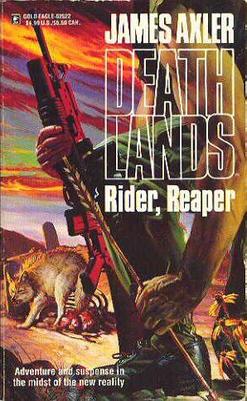 I liked this Deathlands book somewhat less than usual, for a variety of reasons, which I will now elucidate.
I liked this Deathlands book somewhat less than usual, for a variety of reasons, which I will now elucidate.
1) The plot was not organic, and instead was in service of a clear goal that took me out of the writing. See, albino knife-throwing murder machine Jak Lauren left the group a long time ago, to start a life on a ranch in New Mexico. Yet, the in media res opening of Rider, Reaper immediately took the happy ending away from him, solely so the series could have him back. Clumsily enough so that I didn’t even realize it was that style at first, and instead thought I had accidentally picked up the wrong book. (On the bright side, I like him. But man, the clumsiness. Maybe if his family had been murdered during one of the stretches of time when everyone else hadn’t been right nearby, and then found him along the way instead? I dunno.)
2) Due to circumstances, they team up with a group of Navajo warriors to take down the bad guys of the week, and those warriors are portrayed as hot-headed savages worthy of a team-up with 19th century cowboys showing that the white way is manifestly the correct one, instead of 22nd century survivors of a society-ending nuclear war. It was just so bad, and all the moreso for me being used to this series’ shockingly common egalitarianism. Ugh. I am pretty sure the author hasn’t changed yet and won’t for a long time, so I hope it is a one-off problem, and not a sign of things to come due to editorial changes or some other permanent shift.
All that said, the set up of the next few books is pleasing to me, and I continue to look forward to where things are going. Please oh please let this be merely a small bump in the road.
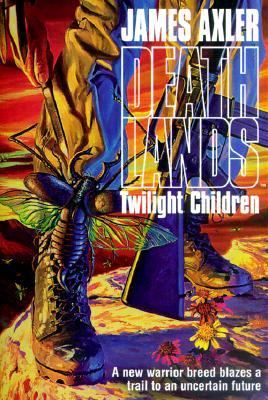 On Sunday, I read
On Sunday, I read 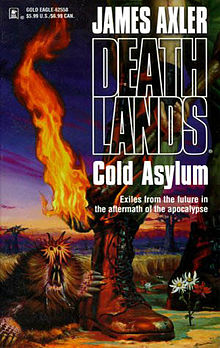 On Saturday I read
On Saturday I read 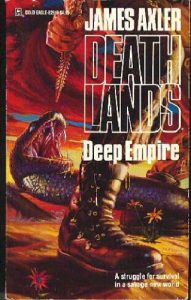 If you are paying a lot more attention than I would expect anyone to be paying, you would expect this review to cover the second Robin Hobb book. However, I ran into a pair of related problems. Maybe a trio of interrelated problems? You decide! See, thing one is that I’m still trying to read the series in conjunction with my wife. Thing two is that I went camping last weekend. The problem with that is that while I read a lot in the woods, she really does not. Thing three, which may or may not count as an actual thing, is that I didn’t want to deal with reading comics on my convertible laptop in the woods, because it’s quite a bit harder to handle / keep safe than a tablet in a case would have been. The relevance of this is that comics would have slowed me down quite a bit and made it at least mildly feasible that I could read the Farseer book without pulling irretrievably far ahead.
If you are paying a lot more attention than I would expect anyone to be paying, you would expect this review to cover the second Robin Hobb book. However, I ran into a pair of related problems. Maybe a trio of interrelated problems? You decide! See, thing one is that I’m still trying to read the series in conjunction with my wife. Thing two is that I went camping last weekend. The problem with that is that while I read a lot in the woods, she really does not. Thing three, which may or may not count as an actual thing, is that I didn’t want to deal with reading comics on my convertible laptop in the woods, because it’s quite a bit harder to handle / keep safe than a tablet in a case would have been. The relevance of this is that comics would have slowed me down quite a bit and made it at least mildly feasible that I could read the Farseer book without pulling irretrievably far ahead.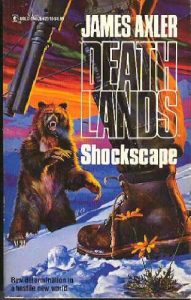 I was poised to read a Robin Hobb book, but then my schedule got pushed back, so I went for something guaranteed to be quick and easy. And then work was a bear[1], and I realized a new Walking Dead was out, so now I’m actually behind on starting the Hobb instead of ahead. Oh well, that’s what happens when I try to keep to a schedule on much of anything besides work and vacations.
I was poised to read a Robin Hobb book, but then my schedule got pushed back, so I went for something guaranteed to be quick and easy. And then work was a bear[1], and I realized a new Walking Dead was out, so now I’m actually behind on starting the Hobb instead of ahead. Oh well, that’s what happens when I try to keep to a schedule on much of anything besides work and vacations.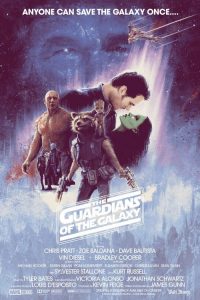 Thing that is awesome: I saw a
Thing that is awesome: I saw a  On Sunday
On Sunday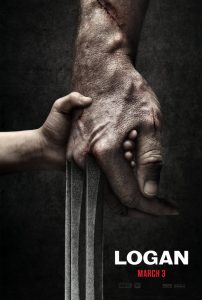 So, another X-Men continuity movie[1].
So, another X-Men continuity movie[1]. 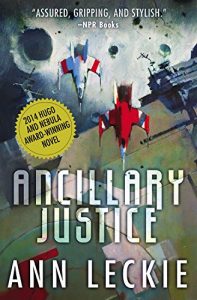 Rumor has it,
Rumor has it, 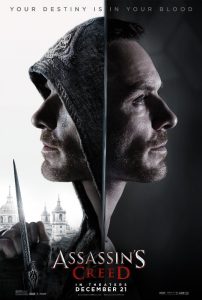 Assassin’s Creed
Assassin’s Creed